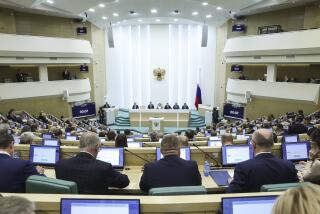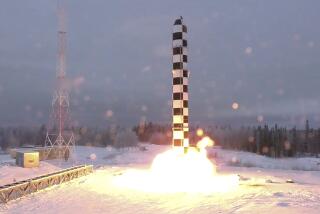Soviet Offer of Moratorium
- Share via
The Soviet Union has proposed a total moratorium on nuclear weapons testing, albeit for a brief time. The Reagan Administration has rejected this offer out of hand, and proposed instead to allow Soviet observers at one of our own tests in Nevada.
I believe the Reagan Administration has made a grave error in doing so.
It is my belief that a total halt to nuclear weapons testing is essential to any meaningful arms control agreement. Until President Reagan took office in 1981, it was the policy of the United States that such an agreement was worth seeking. Since then, Reagan’s people have claimed that such an agreement is “not in our interests at this time,” i.e. that such an agreement would greatly interfere with Reagan’s program of beefing up our nuclear forces. (That it would interfere is precisely the point of such an agreement, and it would interfere equally with any Soviet nuclear program.)
The Reagan Administration maintains that such an agreement is not verifiable. This is false. The consensus of the community of experts in seismology is that we can easily detect explosions much smaller than the 150-kiloton limit currently set by the Threshold Test Ban Treaty. The Reagan Administration has claimed that the Soviets have been violating this treaty. This also is false. The consensus of the seismological community is that the Pentagon officials who cite seismic data to back up this claim are fudging their numbers.
In his story on the Soviet proposal and the Reagan Administration’s counterproposal, George Skelton quotes Secretary of State George P. Shultz as recalling that the ending of an earlier, open-ended moratorium on nuclear testing by the Soviets is proof that they cannot be trusted in this proposal. Here, Shultz is obscuring history.
The United States and the Soviet Union did agree informally to a testing moratorium pending negotiations of a total test ban treaty. Both sides kept their word . . . until France (who was not a party to the agreement) began a series of nuclear tests. At that time the Soviets announced that there was no point in their continuing the moratorium in the face of the threat from France, and resumed testing. The United States immediately followed suit. It was clearly not simply a matter of the faithless Commies breaking yet another promise. Moreover, the ban on atmospheric testing has been honored to the letter by both the United States and the Soviet Union for more than 20 years.
A five-month moratorium would be largely symbolic, and would not interfere significantly with either nation’s nuclear weapons programs. Nevertheless, it could also serve as a context for negotiating a permanent test ban, providing evidence to both sides and the rest of the world that the negotiations were indeed taking place in good faith.
Rather than rejecting this offer of real substance from the Soviets, President Reagan should have accepted it immediately. If nothing else, if it turned out that the Soviets were not as good as their word, we could easily resume testing without having lost anything.
ALAN L. BOSTICK
Pasadena
More to Read
Sign up for Essential California
The most important California stories and recommendations in your inbox every morning.
You may occasionally receive promotional content from the Los Angeles Times.













